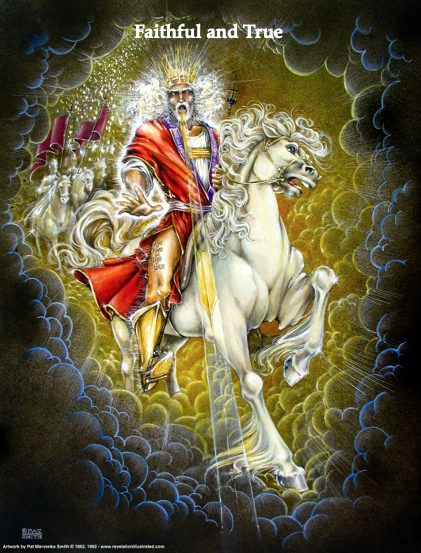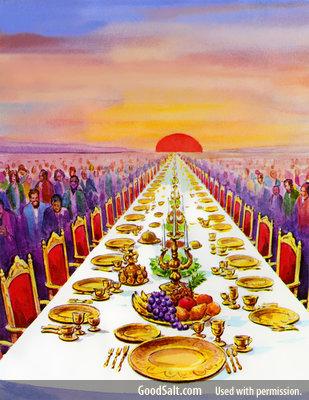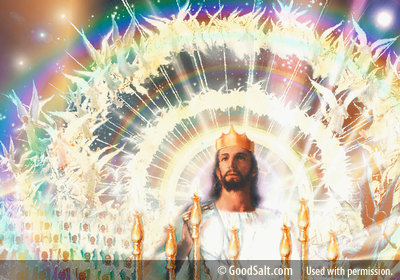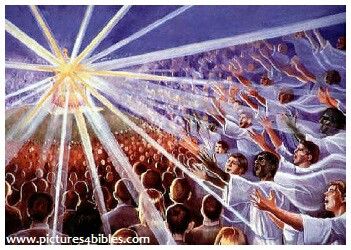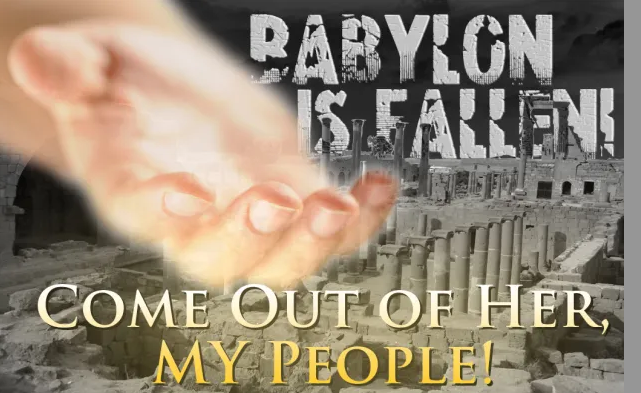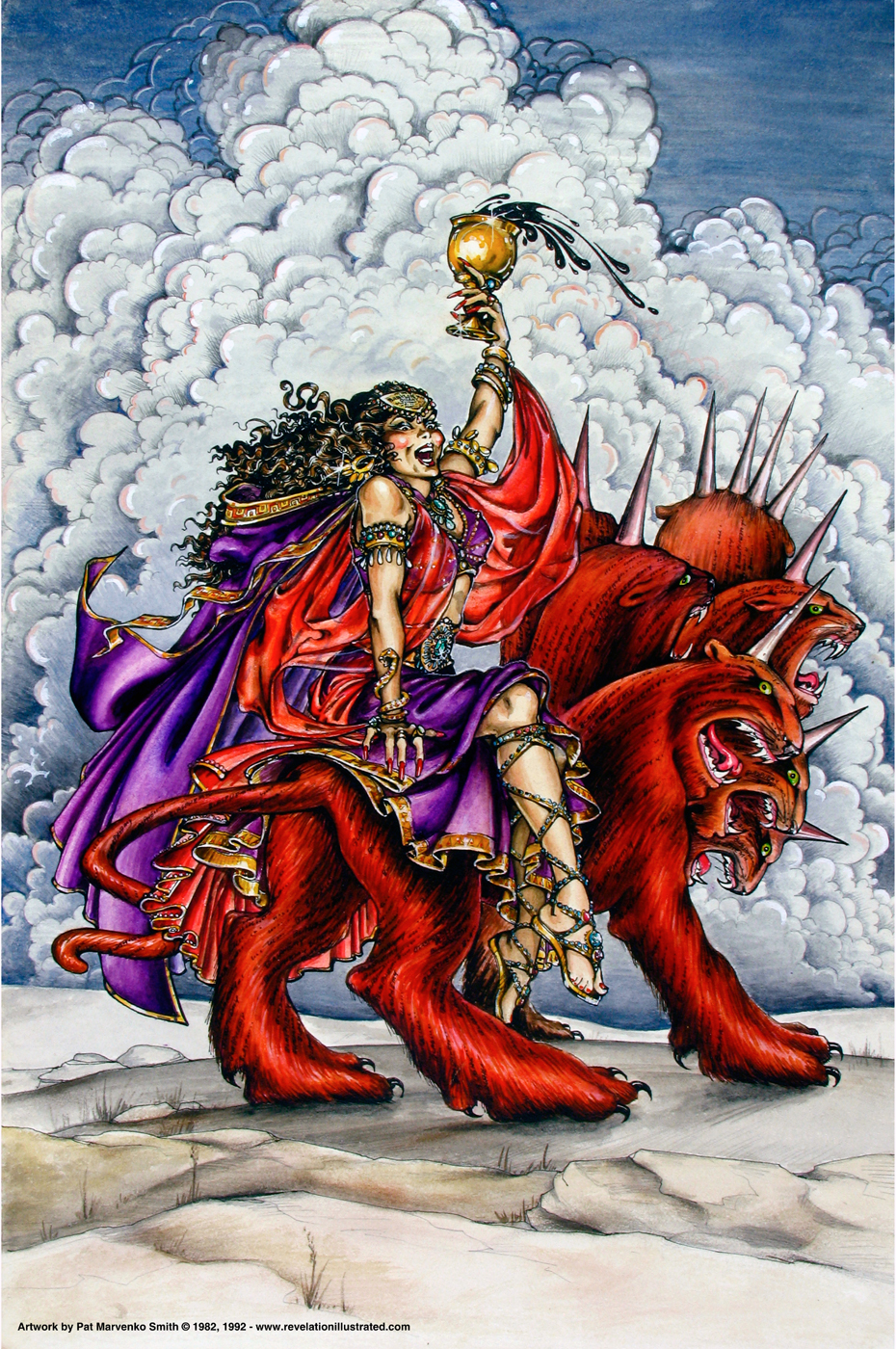“Now I saw heaven opened, and behold, a white horse. And He who sat on him was called Faithful and True, and in righteousness He judges and makes war.” Revelation 19:11
In our study of the book of Revelation, we are now ready for the final section which centers around the reign of the coming King of kings, Jesus Christ (19:11-22:21). After Jesus and His church return to earth to defeat His enemies gathered at Armageddon (19:11-21), Christ will rule the earth from Jerusalem with His faithful followers while Satan is bound during those thousand years (20:1-6). At the end of His Jesus’ thousand- year-reign, Satan will be released and lead a final rebellion only to be defeated and cast into the lake of fire forever (20:7-10). Then all those who did not believe in Jesus will stand before the Great White Throne Judgment to determine the degree of their punishment in the lake of fire and then they will be cast into it (20:11-15). Following this, God will destroy the old heavens and earth with fire (21:1a; cf. 2 Peter 3:10-13) and create a new heaven and new earth which will be perfect. Believers in Jesus will live with Him forever on the new earth, with Jesus and His church reigning from the New Jerusalem (21:1b-22:21).
For centuries believers have prayed for Christ’s return (cf. Matthew 6:10; Revelation 6:10; 22:20) and now the apostle John records the answer to their prayers beginning in Revelation 19:11. Following the four outbursts of praise for God in heaven (19:1-10), John writes, “Now I saw heaven opened, and behold, a white horse. And He who sat on him was called Faithful and True, and in righteousness He judges and makes war.” (Revelation 19:11). Twice in the book of Revelation the door to “heaven” was “opened” (4:1; 19:11). The first time was so the church, represented by the “twenty-four elders,” could be received into heaven at the time of the Rapture (Revelation 4:1-4; cf. I Thessalonians 1:9-10; 4:13-5:11).
Keep in mind, that the church has been in heaven during the terrible judgments of the Tribulation on the earth. While in heaven, the church, the Bride of Christ (cf. Revelation 3:20; 21:2, 9; 22:17; 2 Corinthians 11:2; Ephesians 5:25-32), was being prepared to return to earth with King Jesus. This preparation involved every Christian standing before the Judgment Seat of Christ (2 Corinthians 5:10; Romans 14:10-12) to determine their eternal rewards, one of which was receiving a “white garment” or “fine linen” for one’s “righteous acts” (Revelation 3:5; 19:7-8; cf. Matthew 22:1-14; 25:14-30; Luke 19:11-26). After being properly clothed, faithful believers in the church will be escorted to earth by King Jesus for their marriage celebration which will last one thousand years on earth (Revelation 19:7a; 20:4-6; cf. Isaiah 25:6-9; 35:1-10; 55:12).
In Revelation 19:11, we see the second time the door to “heaven” is “opened.” This time it is so Christ can leave heaven with His Bride, the Church, to return to earth (Revelation 19:7-8, 11). John sees a “white horse” which is a symbol of victory and triumph over one’s enemies. 1 A Roman conqueror typically rode a white horse in a triumphant procession. 2 At His first coming, Jesus is portrayed as a humble Servant riding into to Jerusalem on the back of a donkey (Matthew 21:1-11). But in 19:11, Jesus is described as a victorious Warrior-King riding on the back of a white stallion. 3
The Rider on this white horse is “called Faithful and True,” a clear reference to Jesus Christ. 4 Christ is “Faithful,” in that He is loyal and reliable; and He is “True,” in that He is authentic and trustworthy. This is a stark contrast with the “beast” or Antichrist who was unfaithful, in that he broke his covenant with Israel (Daniel 9:27), and he was untrue, in that he deceived the nations to worship and follow him (Revelation 13:1-18; 16:13-14; 19:20). At His second coming, Jesus will be “Faithful” and “True” to His promises about His second coming, especially as they relate to the Messiah as He “judges and makes war” against the beast and his armies. Imagine what the world will be like as King Jesus “judges and makes war” in “righteousness.” No longer will we have a political leader who tells us what he thinks we want to hear. Instead, we will have a Ruler who tells us what we need to hear. No longer will there be injustice or partiality in government. No longer will there be unjust wars and abuse of power. No longer will promises be broken or lies constantly told. Under King Jesus, all that is corrupt, unrighteous, unfaithful, and untrue will be gone. The world will finally have a Ruler who is perfect in all His ways and completely trustworthy and faithful! Oh, how my heart longs for our King of kings and Lord of lords to come to earth and make things right!!!
We also need to realize Jesus is just as “Faithful” and “True” today as a Savior to the world as He will be in the future. As our Savior, He is “Faithful” to His promise of eternal life (John 3:15-16; 4:10, 14; 6:40, 47; 11:25-26; et al.) and “True” in all He says and does, so we can trust Him with our eternal lives.Christ has the perfect ability to tell us the awful “Truth” about ourselves (we are undeserving sinners – Romans 3:23; 5:8), while holding us up because He is “Faithful” to His promises (Isaiah 41:10; Matthew 12:20). Because He is “True,” He was the perfect sacrifice to pay the penalty for all our sins (2 Corinthians 5:21; I Peter 3:18; John 19:30). Because He is “Faithful,” we can come to Him just as we are, without having to clean up our lives first (John 6:37; Matthew 11:28). And because He is full of “Truth,” we can come in complete confidence knowing that He will keep His promise to grant us eternal life the moment we believe or trust in Him for it. Jesus promised, “He who believes in Me has everlasting life” (John 6:47b).
After we receive Jesus’ gift of everlasting life, we may stumble and fall many times. But even if we are unfaithful to Jesus after He saves gives us eternal life, He remains “Faithful” to His promise. “If we are faithless, He remains faithful; He cannot deny Himself.” (2 Timothy 2:13). Did you understand what you just read? Even if we stop believing in Christ or being faithful to Him, He remains faithful to us because He cannot deny Himself, which includes His body – you and me – and His promises. Our eternal security is not based on our faithfulness to Jesus, but His faithfulness to Himself.
Some of you may doubt you are saved because you have been told if you don’t change a certain amount or grow spiritually to a certain degree, you are not saved. Jesus is not like that. He remains “Faithful” to His promise of eternal life to all who believe in Him whether you are faithful to Him or not. He did not say, “He who remains faithful or believes in Me and remains faithful has everlasting life.” No, He simply said, “He who believes in Me has everlasting life.” What is our responsibility in going to heaven? “Believe in Jesus.” What is Jesus’ responsibility? To give us “everlasting life.” Christ’s faithfulness is not based on ours. It is because He is “Faithful” and “True.” If He broke His promise of eternal life to all who simply believe in Him, He would be neither “Faithful” nor “True.”
Remaining faithful to Christ is necessary for eternal rewards in heaven, not entrance into heaven (Revelation 2:10, 25-27; 17:14; cf. Galatians 5:21-22 – “inherit” refers to inheritance rewards – Colossians 3:23-24). As we learn to set our minds on the things of the Spirit (Romans 8:1-39) and rely on Jesus through His Holy Spirit to produce His faithfulness (Galatians 5:15-22), we can finish our Christians lives faithful to Christ and receive His eternal rewards at the Judgment Seat of Christ (2 Corinthians 5:10).
Prayer: Father God, we praise You for the day when Your Son will return to earth to defeat His enemies and reign in righteousness. Only Jesus is Faithful and True to judge the world in righteousness. Thank You Lord Jesus for being Faithful to Your promises and True in all Your ways. We are forever grateful for Your grace that delivered us from the judgment we deserved. Your sacrifice for all our sins made it possible for us to receive eternal life the moment we believed in You. Please enable us to remain faithful to You until the end of our lives on earth so we may honor You more with the rewards You give us for all eternity. In Your precious name, we pray Lord Jesus. Amen.
ENDNOTES:
1. Bob Vacendak; Robert Wilkin; J. Bond; Gary Derickson; Brad Doskocil; Zane Hodges; Dwight Hunt; Shawn Leach; The Grace New Testament Commentary: Revised Edition (Grace Evangelical Society, Kindle Edition, 2019), pg. 1574.
2. Tom Constable, Notes on Revelation, 2017 Edition, pg. 84 cites Archibald Thomas Robertson, Word Pictures in the New Testament Vol. 6 (Nashville: Broadman Press, 1931), pg. 340); cf. John F. Walvoord, The Bible Knowledge Commentary Epistles and Prophecy, Editors John F. Walvoord and Roy B. Zuck (David C. Cook, 2018 Kindle Edition), location 6276.
3. Vacendak, pg. 1574.
4. Ibid.; Constable, pg. 210.

